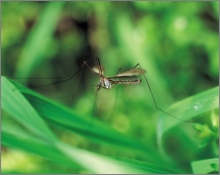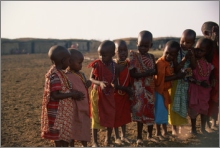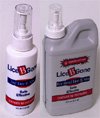The Deadliest Animal on Earth: A Short and Important Overview
by www.SixWise.com
The deadliest animal on earth is deceptively small and vulnerable, with a typical lifespan of just one to two weeks -- a month at the most.
|

Only female mosquitoes bite people (males feed on plant juices), and their saliva contains anticoagulant proteins that prevent your blood from clotting and make it easier for them to feed.
|
Yet, despite its short time on earth, it manages to kill more than 1 million people each year.
What is it?
The world's deadliest animal, according to the Smithsonian National Zoological Park, is the female anopheles mosquito. This is the only genus of mosquito that's capable of transmitting the malaria virus, and it is through this disease transmission that a single mosquito bite can turn deadly.
In fact, there are about 3,500 species of mosquitoes, according to the U.S. Centers for Disease Control and Prevention (CDC), and 430 of them are anopheles species. Of these 430, only 30-40 actually transmit malaria, and among them, only the females do so.
Why only females? Because male mosquitoes feed only on sugar sources like nectar. Females, meanwhile, will feed on sugar sources for a time, then seek out a blood meal to help her eggs develop. If a female mosquito takes a blood meal from a person infected with malaria parasites, the mosquitoes pick up the sexual parasite forms called gametocytes.
In about 10-18 days, the gametocytes develop into infective parasites and are found in the mosquito's salivary gland. When the mosquito takes another blood meal, that person will then get infected with the malaria parasite.
What is Malaria, and Why is it So Deadly?
Every year, 300 million to 500 million cases of malaria occur worldwide, according to the CDC, and over 1 million people die, mostly young children living in sub-Saharan Africa.
The disease occurs when the parasites invade your red blood cells, causing a flu-like illness with high fevers and shaking chills, and if not treated immediately it can lead to coma, kidney failure, and death. Though symptoms typically arise 10 days to four weeks after infection, it can take up to a year for a person to feel sick.
Malaria is most common in developing countries, particularly Africa where a child dies from malaria every 30 seconds, but anopheles mosquitoes are also found in the United States.
"About 1,300 cases of malaria are diagnosed in the United States each year. The vast majority of cases in the United States are in travelers and immigrants returning from malaria-risk areas, many from sub-Saharan Africa and South Aisa," says the CDC.
|

In Africa, a child dies from malaria every 30 seconds.
|
In fact, although malaria itself has been eradicated in the United States since the early 1950s, the two species of anopheles mosquitoes that were largely responsible for U.S. malaria cases prior to eradication are still widely prevalent. Because of this, there is always a risk of malaria being reintroduced in the United States.
For instance, the CDC reports that between 1957 and 2003, 63 malaria outbreaks of locally transmitted mosquito-borne malaria occurred in the United States.
Can You Avoid Coming Into Contact With a Female Anopheles Mosquito?
If you will be traveling to a country where malaria is transmitted, the CDC recommends taking precautions to prevent mosquito bites and even taking antimalaria drugs, as about 800 cases of malaria are diagnosed in such travelers every year. The countries where malaria is transmitted are:
-
Large areas of Central and South America
-
The island of Hispaniola (includes Haiti and the Dominican Republic)
-
Africa
-
Asia (including the Indian subcontinent, Southeast Asia and the Middle East)
-
Eastern Europe
-
The South Pacific
|
Repel Mosquitoes Naturally With Lice B Gone
 The active chemical ingredient in most insect repellents available in the United States -- DEET -- may be harmful to your health. To repel insects like mosquitoes naturally, try Lice B Gone, the 100% safe, pesticide-free lice shampoo that doubles as an excellent insect repellant. The active chemical ingredient in most insect repellents available in the United States -- DEET -- may be harmful to your health. To repel insects like mosquitoes naturally, try Lice B Gone, the 100% safe, pesticide-free lice shampoo that doubles as an excellent insect repellant.
You can safely spray Lice B Gone on your skin or mist outdoor areas to keep mosquitoes, flies, gnats, and other pests away for up to three hours!
Learn More About Lice B Gone Now!
|
Keep in mind that travelers to sub-Saharan Africa have the greatest risk of not only getting malaria, but also of dying from the infection. Tips to prevent mosquito bites include wearing long-sleeved clothing, using insect repellant and bed netting, avoiding going outside at night (when mosquitoes that transmit malaria are most likely to bite) or residing in an air-conditioned, screened environment.
In the United States, similar precautions apply. If you're going to spend time outdoors, wear long pants, socks and long sleeves. Mosquitoes can bite through thin material, so you may want to spray a chemical-free (look for a non-toxic variety that doesn't contain DEET) insect repellant on the outside of your clothes. You may also want to apply it to exposed skin. One such safe repellant is Lice B Gone -- it's a lice shampoo that contains no harmful pesticides or irritating chemicals that doubles as a non-toxic insect repellant. Some people also spray it outside to keep pests away when they're entertaining. Dusk and dawn are peak mosquito hours, so take extra precautions during these times.
Since mosquitoes lay eggs in standing water, you can reduce the number of mosquitoes around your home by eliminating any standing water (flower pots, birdbaths, pet water dishes, barrels and more can all be culprits). Keep mosquitoes out of your home by installing tight-fitting screens into all your windows and doors (and repairing any holes in existing ones).
If you've traveled to a malaria-prone area, be sure to see your doctor immediately if you come down with a flu-like illness up to one year after you return home (and be sure to tell the physician about your travel). If treated promptly, malaria is usually curable.
Recommended Reading
Bugs that Bite: Interesting Facts & Necessary Precautions on the Insects That Crave You
Which Pest Insects Pose Dangers to You (and Which are Just Merely Gross)?
Sources
Smithsonian National Zoological Park
CDC: Malaria: Topic Home
CDC: Malaria and Travelers
CDC: Anopheles Mosquitoes